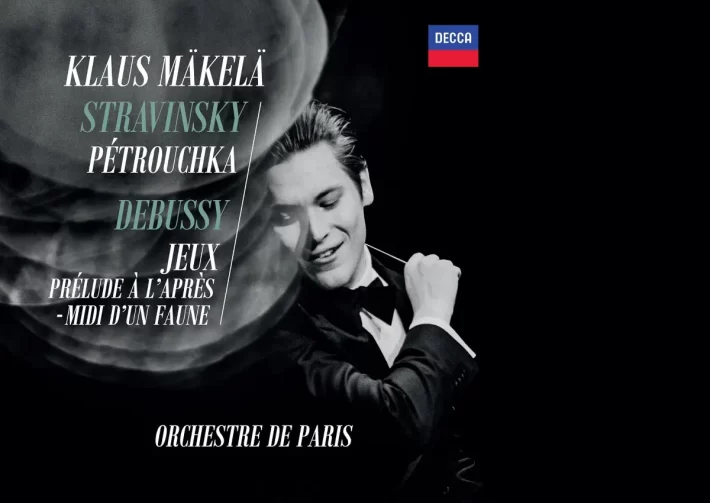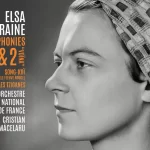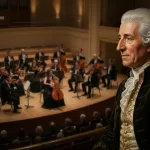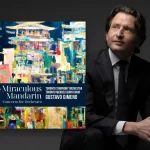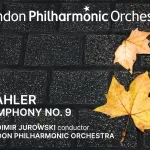With the inclusion of Pétrouchka in this new release, admirers of Mäkelä and his Parisian orchestra now have their recordings of Stravinsky’s three great Russian ballets written for Serge Diaghilev and his Ballets Russes. Reviewing this partnership’s previous album with “The Rite of Spring” and “The Firebird,” I suggested Mäkelä’s interpretative priorities were better suited to the urbane colors of Firebird than the Rite’s brutal primitivism.
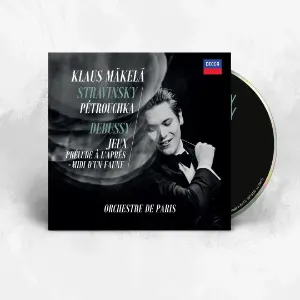
Check offerings of Klaus Mäkelä’s new album on Amazon.
I also expressed hope that future releases would include less recorded repertoire. Here the fillers are Debussy’s “Jeux” and “L’apres-midi d’un faune,” both of which are well represented in the catalogue. Surprisingly, the Orchestre de Paris apparently recorded these Debussy works 40-some years ago, and its last Pétrouchka recording was led by Semyon Bychkov in 1991 (Philips, NLA). Their desire to make new recordings of this repertoire is therefore certainly understandable, though competition in all three works is fierce.
Mäkelä’s “Pétrouchka” does an admirable job of highlighting Stravinsky’s stylistic shift between the two ballets. In “Firebird” one hears the influence of Tchaikovsky and especially Rimsky-Korsakov, but in “Pétrouchka,” Stravinsky finds his individual voice, which features more harmonic dissonance, shorter, disjunct melodies, and primal rhythms (executed by an enlarged percussion section). These elements repeatedly stood out in this performance.
And I find little to fault in the playing. The Orchestre de Paris plays with an enviable finesse, sophistication, and unanimity, revealing lots of inner detail. Wind solos are excellent, the flute especially so, and the bassoons are vividly characterful. The piano, too, is especially emotive. In short, this reading has Gallic eloquence – but this score requires so much more.
Tempos are sometimes slow, lacking dramatic impetus. Compare the opening minutes of this reading with Chailly’s Concertgebouw performance (also on Decca) – the agitated atmosphere in Amsterdam is far more compelling. The Parisians play with a rounded attack that dampens the many moments of razor-sharp articulation, as heard in Boulez’s Cleveland recording (DG). And Decca’s overly reverberant sound only adds to this problem. This lack of urgency extends, unfortunately, to the digital experience. Listeners who purchase the album through download or streaming are left without essential context due to the absence of program notes (as of the publication date of this review).
More frustratingly, the action of the story sometimes seems of secondary importance. Musicologist Jeremy Noble argues that Pétrouchka is the first score in which Stravinsky established his ability “…to express physical gestures and movements (and the psychological states that prompt them) in purely musical terms.” With a primary focus on beauty, the narrative arc of Mäkelä’s reading feels short changed, especially when compared to Gergiev’s particularly drama-centric recording (Mariinsky).
“Jeux” is more successful. This is an abstract score, emotions held in check. It also has sixty-some tempo changes in a score that lasts less than 20 minutes. In lesser hands those changes can seem disjointed, but here it feels organic, with top-notch, at times ravishing playing that nevertheless cannot eclipse Haitink’s famous Concertgebouw recording (Philips/Decca). Unfortunately, despite ravishing flute playing, the sensuality of “L’apres-midi d’un faune” is far too chaste. The score’s sensuous eroticism is far better caught by Haitink, Karajan (first Berlin recording on DG), and Stéphane Denève (part of an enticing Super Audio two-CD set of Debussy works, including Jeux) on Chandos.
Mäkelä’s energetic and detailed reading of Pétrouchka offers a fresh perspective on Stravinsky’s evolving voice. While this release faces stiff competition from recordings that prioritize drama, it will undoubtedly hold interest for admirers of the conductor and those seeking a modern Pétrouchka from this orchestra.

Recommended Comparisons
Stravinsky – Pétrouchka: Chailly | Boulez | Gergiev | Salonen
Debussy – Jeax, faune Prelude: Haitink | Deneve | Boulez | Karajan

Check offerings of Klaus Mäkelä’s new album on Amazon.
Album Details |
|
|---|---|
| Album name | Igor Stravinsky · Claude Debussy – Klaus Mäkelä |
| Artist | Orchestre de Paris |
| Artist | Klaus Mäkelä – Conductor |
| Label | Decca |
| Catalogue No. | 00028948701469 |
| Amazon link | Buy here |
| Work | Stravinsky – Petrushka, K12 (1947 Version) |
| Work | Debussy – Jeux, Poème dancé, CD 133 |
| Work – | Debussy – Prélude à l’après-midi d’un faune, CD 87a |
Included with an Apple Music subscription:
Latest Classical Music Posts
- Review: Elsa Barraine – Symphonies 1 & 2 – Orchestre National de France, Cristian Măcelaru
- Top Five – Haydn – The Cello Concertos – The Best Recordings
- Review: De Profundis – Charles Owen Plays Liszt and Franck
- Review: Bartók – The Miraculous Mandarin, Concerto for Orchestra – Toronto Symphony Orchestra & Choir, Gustavo Gimeno
- Review: Schumann – Fantasie, Humoreske, Faschingsschwank aus Wien – Nikolai Lugansky
- Review: Mahler – Symphony No. 9 – London Philharmonic Orchestra, Vladimir Jurowski
Read more classical music reviews or visit The Classic Review Amazon store

